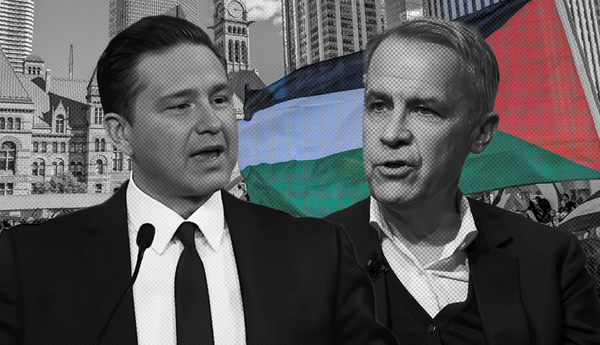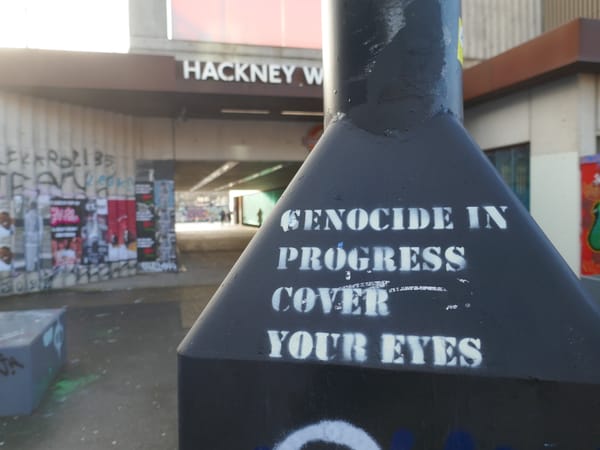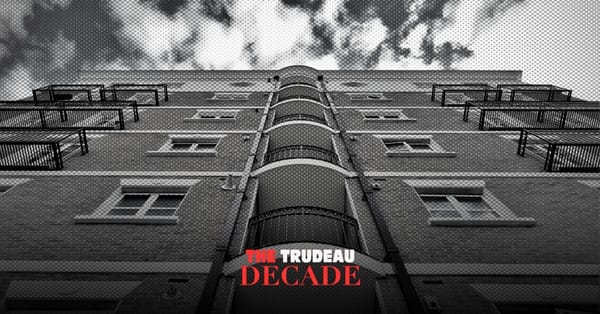This is the second part in a series on Irwin Cotler. The first part critically examines Cotler’s claim that he was Nelson Mandela’s lawyer.
In November 2020, Irwin Cotler, then 80 years old, started a new chapter in his political career. That month, Prime Minister Justin Trudeau named Cotler as Canada’s first special envoy on preserving Holocaust remembrance and combating antisemitism. Cotler had previously held a wide range of political positions as a Liberal — including as the member of parliament for Mount Royal from 1999 to 2015 and the minister of justice and attorney general of Canada — but the envoy appointment was in many ways the culmination of all of his past work and advocacy.
Cotler’s appointment garnered praise from several Jewish, Israel lobby groups, with B’nai Brith saying that they “warmly [welcomed]” the decision and “[applauded] the selection of Mr. Cotler as an excellent choice,” the Centre for Israel and Jewish Affairs (CIJA) claiming that “there is no one more qualified than Mr. Cotler,” and the Friends of Simon Wiesenthal Center noting they were “thrilled” by the appointment. The appointment also drew some criticism, with Marion Kawas calling it “the crown jewel in Canada’s anti-Palestinianism” and Independent Jewish Voices Canada (IJV) saying that it would likely be “counterproductive to the fight against antisemitism.”
I agree with all of these figures and organizations. Ideally, Cotler would have never been appointed as envoy. But in Canada as it is, there could be no choice other than Cotler to lead this office, which in 2022 was granted a budget of more than $5.6 million over the course of five years. Cotler is perfect for the role — a living embodiment of Canada’s troubling approach to antisemitism, Israel and Palestine.
To explain why that’s the case, I’m going to outline Cotler’s flawed conception of antisemitism, his consistent defence of heinous Israeli actions and his personal connections to members of the state’s political system.
Conception of Antisemitism
I believe Cotler genuinely cares about combating what he perceives as antisemitism. This appears to have been a consistent motivating force throughout his political career, and he seems to be doing what he thinks is best for the majority of Jewish people in Canada and abroad. He also has the main credential Canada finds necessary for appointees in such positions: being deeply enmeshed with the political system. And yet, there’s a problem.
As special envoy, Cotler is supposed to fight against antisemitism. However, there’s widespread disagreement as to what constitutes antisemitism and what methods can be best utilized to combat it. There’s also legitimate concern (and clear evidence) that charges of antisemitism are used to silence and deter critics of Israel and Zionism. Cotler has long been accused of doing exactly that, both through his leading role in the “new antisemitism” movement and his advocacy for the implementation of the International Holocaust Remembrance Alliance’s (IHRA) definition of antisemitism.
In November 1985, the Montreal Gazette ran an article detailing a talk given by Cotler, then a law professor at McGill University, on the supposed scourge of a new sort of antisemitism. Cotler claimed that “classical anti-Semitism” was on the decline, but that a different form was supplanting it: the “denial of the right of the Jewish people as a member of the family of nations.” In this conception, antisemitism isn’t attacking Jewish people as individuals or as a community, but rather critiquing the Israeli state. This article was just the second time the term “new anti-Semitism” appeared in the Canadian Newsstream database, which is an archive of major Canadian newspapers. It has shown up more than 550 times since then, in part because Cotler has continued pushing it on the public.
In February 1989, The Globe and Mail reported that Cotler told a conference: “While classical, traditional anti-semitism is declining, there is a growing international legal sanction for a new anti-semitism that has evolved from the UN condemnation of ‘Zionism is racism.’” In March 1993, the Montreal Gazette advertised a talk by Cotler on “Holocaust Denial and the New Anti-Semitism.” In April 2004, a National Post article quotes Cotler as saying that criticism of Israel at the United Nations and by Arab states had led to a wave of antisemitism “without parallel since the World War II (sic).” In February 2007, Cotler told the National Post “there is a tsunami of new anti-Semitism.” In February 2015, Cotler spoke in the House of Commons and claimed the supposed new antisemitism was “reminiscent of the atmospherics of the 1930s, and without parallel or precedent since the end of the Second World War.” In December 2021, Cotler decried the “new antisemitism” to the Times of Israel, and claimed that he was “disturbed by the fact that antisemitism has for the first time been mainstreamed, normalized, and legitimized in the political culture.” He wrote about it again just last week, claiming that the issue has gotten worse since his appointment.
This conception of antisemitism is reflected in the IHRA definition of the term, which the federal government adopted in 2019. It has proven to be controversial. The summary of an October 2020 IJV report focused on critiquing the IHRA definition claims it fails “to provide an adequate objective standard that can be used to identify antisemitic incidents and/or antisemitic speech,” “is so vague and tautological as to be almost meaningless” and “is not being presented in good faith.” The report argues it has a “pro Israel agenda,” and that the “primary goal of those promoting it — and we fear its actual effect if it is adopted — is to ban or criminalize criticism of both Israel and Zionism, along with support for Palestinian rights.” The report stresses the need to fight antisemitism, but states the IHRA definition is “not the way.”
In December 2022, Hanna Kawas, the chair of the Canada Palestine Association, wrote of the IHRA definition: “The main objective of the IHRA definition is to legitimize Israel and to slander all those who expose its illegal and inhumane activities, putting a chill on the Palestinian solidarity work and covering up for Israeli war crimes. The Israeli Hasbara 3D’s are at work: it distorts the nature of the Palestinian struggle, it distracts from the settler colonialist nature of Zionism, and defames as anti-Semites all those who expose and condemn Israeli atrocities.”
Adoption of the IHRA definition has also been warned against and condemned by a wide range of other figures and groups, including the IHRA definition’s main drafter, Palestinian organizations, academics and lawyers, civil liberty groups, universities, Jewish groups throughout the world, labour unions, student federations, and countless others.
Unsurprisingly, Cotler has been at the forefront of pushing for the IHRA definition, which has already done damage throughout the Western world. Cotler is listed as the head of Canada’s IHRA delegation, and was the head of the country’s team back in 2000 that helped create IHRA as a whole. He has said he worked to get the IHRA definition adopted when he was an MP as well as minister of justice and attorney general. When the government eventually adopted the definition — an event that came after he retired as an MP — Cotler attended the official launch. Moreover, one of Cotler’s official duties as antisemitism envoy is to advance the implementation of the IHRA definition here and abroad. Since he assumed the position, the definition has been adopted by Alberta, Manitoba, New Brunswick, Saskatchewan and Vancouver, as well as many other bodies, indicating he’s done a successful job.
Cotler does sometimes explicitly declare that not all criticism of Israel is antisemitic and argue against treating it as such. He has also voiced some criticisms of Israel that other Zionists may avoid. But even these exceptions are revealing. For example, Cotler was asked by the Jerusalem Post about his criticisms of Israel. Here’s the full list of them, according to the article: “the refusal to recognize the Armenian Genocide, the Yazidi Genocide and, most recently, the ethnic cleansing of Rohingya in Myanmar”; “the status of the African migrants who have illegally entered Israel over the years”; “arms sales to controversial countries like Myanmar”; “the continued delay in bringing the remaining Falash Mura in Ethiopia to Israel.” More recently, he criticized proposed judicial reforms in Israel, claiming that if passed, they would make the state a “flawed democracy.” None of these criticisms are about the fact that Israel is a settler colonial state established through genocide that is practising a system of apartheid against Palestinians. And his claim that some criticism of Israel is fine appears to hinge on Zionists like him being the ones to decide what that line is, which is hardly a sign of a genuine interest in free and open discourse.
In short, Cotler has for decades been pushing a dangerous conception of antisemitism, which generally sees condemnation of Israel as a grave threat that needs to be countered. He helped encourage the federal government in Canada to adopt such a legal definition of antisemitism, and is now officially tasked with spreading it further. This means that the gravest concerns of those who worry charges of antisemitism will be used to attack critics of Israel and Zionism have been validated. But their reasons to worry may not end there, given Cotler’s history of support for Israel.
Israel’s ‘Staunchest Defender’
A 2019 profile of Cotler at the Jerusalem Post claims: “[Cotler] is one of the staunchest defenders that Israel has around the world. Defame Israel? Demonize Israel? You’ll likely be hearing from Cotler.” This is accurate, as when it comes to some of Israel’s most atrocious actions, Cotler has been there over the decades to offer his defence.
In 1982, Israel launched an invasion of Lebanon, which led to more than 17,000 Lebanese, Syrian and Palestinian people being killed, including thousands of civilians. An international commission investigating the illegal invasion found that Israel constantly violated international law throughout it, including by making use of banned weapons, subjecting prisoners to illegal treatment, bombing non-military and civilian targets such as hospitals and schools, and being involved in the Sabra and Shatila massacre. Two years later, Cotler took part in an “America-Israel” dialogue to address “Israel’s public image.” The event wasn’t intended to critique Israel’s actions or get them to change in the future, but rather, as the introduction by the chairman of the dialogue notes, to offer “some skills in the marketing, advertising and communications areas” to gain public support for Israel. The introduction notes that Israel’s actions supposedly “being right” was no longer enough. As part of the discussion, Cotler noted that he would “like to discuss two incidents which have had serious implications for Hasbara matters here, and which during the war in Lebanon had a serious impact in Canada.” The examples focus on a small group of Canadians exposing what Israel did in Lebanon. Rather than see the problem as Israel’s actions, Cotler argues the issue was that its PR strategy wasn’t effective enough in countering the backlash to them. He closes off by claiming that “the incidents described here point to a need for Israel to make Hasbara a priority.”
In 2006, Israel attacked Lebanon again, killing more than 1,100 people, the vast majority of them civilians. In an interview in December 2006, Cotler (then a Liberal MP) said the Conservative Party’s recent federal victory had been welcomed by so many pro-Israel figures because it “supported Israel’s right to defend itself during the war in Lebanon,” and added that this was something he endorsed as well. Earlier that year, Cotler spoke at an event held by the Institute for Counter-Terrorism, and described six supposed fronts that were crucial to Israel’s military efforts, including media relations. Cotler claimed, “What is needed when you plan a war, and when you’re involved in the conduct of the war, is […] a strategy with respect to the battle for the hearts and minds of people.” He complained that Israel hadn’t reacted quickly enough to criticisms of it during the war, and that such justifications for its conduct needed to be done in “real time” and even be “proactive.” Another such front he discussed the need to deal with was the legal one, particularly reports from human rights organizations. He noted that he had “been speaking with Israeli authorities […] for some time now,” telling them that they needed to respond to critical reports from organizations such as Human Rights Watch, and arguing such efforts should be “preemptive.”
In late-2008 into early-2009, Israel pounded Gaza with rockets and then launched a ground invasion, which ended up killing more than 900 Palestinian civilians. That year, Cotler wrote that “Israel was obliged to act in self-defence,” and claimed that the government in Gaza was “threatening the safety and security of Gaza itself.”
In 2014, Israel once again bombed and invaded Gaza. In this case, more than 1,460 civilians were killed. In the midst of the death and destruction, Cotler spoke at a lunch event in Charlottetown. At this event, according to a report from the SaltWire Network, Cotler “placed the blame for this conflict squarely on the shoulders of Hamas” and alleged that “the real root cause of the troubles in Gaza is Hamas’s unwillingness to recognize Israel’s right to live in peace.”
From 2018 to 2019, Palestinians in Gaza launched a series of protests called the Great March of Return, where each Friday they marched to the border demanding that refugees be allowed to go back to their homelands. Throughout this period, Israeli army snipers shot more than 8,000 Palestinians, leaving many with “life-changing wounds” and killing more than 220, including journalists and medics. These events led to protests around the world in solidarity with the Palestinians. In the midst of this, Cotler once again blamed Palestinians. On Twitter, he referred to the protests as “incendiary mobilization” and claimed they were a plan “to propel Palestinians to suicide terrorism against Israelis – using human shields for cover – [and then blame] Israel for tragic deaths of Palestinians,” and called on “international political and [human rights] leaders [to] speak up and condemn it.”
These comments represent nearly four decades of active support from Cotler for brutal Israeli military efforts, which has led protesters to condemn him on multiple occasions. In 2002, a group of people in Montreal occupied Cotler’s constituency office, claiming that he “embodies the hypocrisy of our government’s policy” and “is a renowned international human-rights lawyer who pathologically ignores Israeli violations of Palestinian human rights.” In 2019, protesters disrupted an event at Concordia University featuring Cotler, critiquing him for his “constant justification of Israeli violence against Palestinians.” Last year, Cotler was accused of being the featured speaker at an event that contributed to “anti-Palestinian racism” in a letter signed by a group of 45 professors and lecturers at the University of Toronto.
Israel’s Unofficial Adviser
Cotler’s personal life has also been deeply enmeshed with current and former Israeli government figures.
Cotler met his wife, Ariela Zeevi, on a trip to Israel. The Canadian Jewish News reports that “at the time [Ariela] was the parliamentary secretary for Likud and a close confidant of [Israeli Prime Minister Menachem] Begin,” a position she held from 1967 to 1979. An article from the Jerusalem Post claims that Cotler’s advocacy can be in part attributed to Ariela.
Ariela’s views on Canadian policies toward Israel have been taken seriously by politicians and media alike. In 2006, then federal Liberal leadership candidate Michael Ignatieff called an Israeli airstrike on a residential building in Qana, Lebanon — which killed 28 civilians, including 16 children — a “war crime.” This comment so incensed Ariela that she left the Liberal Party. Ariela was interviewed by media outlets interested in her comments, and penned an open letter to Ignatieff, parts of which got published in the National Post. Ariela wrote: “I was hoping that you would be able to distinguish between a country who tried to protect its civilians from a terrorist organization, and a terrorist organization who used its own women and children as human shields in Qana, and in other parts of southern Lebanon.” She accused Ignatieff of having “a lack of moral integrity, sacrificing facts and truth on the altar of political correctness and personal political gains in the upcoming leadership election for the party.” Ignatieff responded by saying, “I regret the decision of Mrs. Cotler. She is a remarkable woman who did a lot for the party and Mr. Cotler is a friend of mine.” Bob Rae, then another Liberal leadership contender, said, “If I am successful in winning the leadership, I will do everything I can to woo [Ariela] back.” Ignatieff would eventually say that he would visit Israel to “learn first-hand” about its government’s perspective on the war crime.
Cotler’s step-daughter (often referred to just as his daughter), Michal Cotler-Wunsh, served in the Israeli army, and ran multiple times as a candidate in federal Israeli elections for the Blue and White party, headed by the general who commanded the army during its 2014 assault on Gaza. She eventually entered the Knesset in 2020. That year, Haaretz columnist Gideon Levy wrote an article about her titled “What a Surprise – Even a Proud Liberal Zionist Scion Can Be a Racist.” Levy mentioned her connection to Cotler, and wrote, “Neither father nor daughter apparently see any contradiction between human rights and occupation, or between racism and Zionism, between apartheid and Israel. There is a subset of liberal Jews, mainly in the United States and Canada, intellectuals who see themselves as enlightened and progressive, who fight injustices all over the world, until it comes to Israel, which in their eyes is above all suspicion. This is where they close their eyes and their consciences fall silent. They see nothing.” (Michal denied the claims in the article, and called it “defamatory.”)
In 2019, the Jerusalem Post reported that Moshe Ya’alon, a former Israeli defence minister, called Cotler his “unofficial adviser for many years.” An article by Asa Winstanley about Ya’alon notes that he “evaded [a] war crimes arrest [and] called Palestinians ‘cancer.’” His tenure as “defence minister” included the 2014 bombardment of Gaza.
Also in 2019, a group of Conservative and Liberal MPs met with Chaim Silberstein, who Ricochet describes as “a far-right developer of property in occupied East Jerusalem who has insisted that settlers should be free to ‘shoot to kill’ rock-wielding Palestinians.” At this meeting, Silberstein pushed the idea of moving Canada’s embassy to Jerusalem, as well as establishing a Jerusalem Caucus in Parliament. Israel National News reported that he “provided them with talking points for the media and for their colleagues as to why Canada should move its embassy to Jerusalem.” The publication also reported that Silberstein met with Cotler and Ariela, who “expressed enthusiasm and partnership in these ideas and promised to help promote them with the Liberal side of the Parliament in Canada.”
Cotler has spent decades making excuses for, or outright justifications of, brutal and illegal Israeli military actions. He’s even taken it a step further, offering advice, both in public and behind the scenes, to Israeli government figures — some of whom he has personal ties with — about how to market these actions. This is further proof that Cotler’s conception of what antisemitism is and how it can be fought is irredeemably flawed due to his adoration of Israel.
As I mentioned at the beginning of this piece, I believe that Cotler’s track record makes him a poor choice to be antisemitism envoy. And yet, because of the sort of country Canada is, he is also a perfect choice. The reaction to his appointment is further proof of that.
It’s not a surprise that Cotler was chosen by the Liberals. But the Liberals aren’t the only party in the House of Commons, and it’s rare that they all agree with each other. Take, for example, the recent appointment of Amira Elghawaby as Canada’s special representative on combating Islamophobia. Trudeau’s choice led to political backlash, including unanimous condemnation from Quebec’s National Assembly, Conservative Party Leader Pierre Poilievre and Bloc Quebecois Leader Yves-François Blanchet. (Cotler, for his part, congratulated Elghawaby.)
Cotler’s appointment, meanwhile, was met without opposition from MPs in any Canadian political party in the House of Commons (and indeed, with much applause). But beyond merely failing to offer any sort of opposition or even questioning of the appointment, the political establishment has gone out of its way to demonize those who express concerns about Cotler. In 2019, as mentioned, protesters briefly interrupted an event where Cotler was a featured speaker to bring up his alleged support for Israeli war crimes. Shortly after, a Conservative MP in the House of Commons asked if the government would “condemn this attack on free speech of one of Canada’s human rights defenders?” Cotler received a standing ovation from what looked to be nearly all of the MPs there.
This is a sign of the widespread support for Israel, the conflation of antisemitism with criticism of the state and Zionism, and the complete disregard for the lives and concerns of Palestinians in the country and abroad throughout the entire House of Commons. It is these flaws that have led Canada to be among a few rogue states in the world that uncritically support almost anything Israel does.
The country’s shame is Cotler’s gain, however, as those with views such as his, who would be shunned in much of the rest of the world, are celebrated here.







